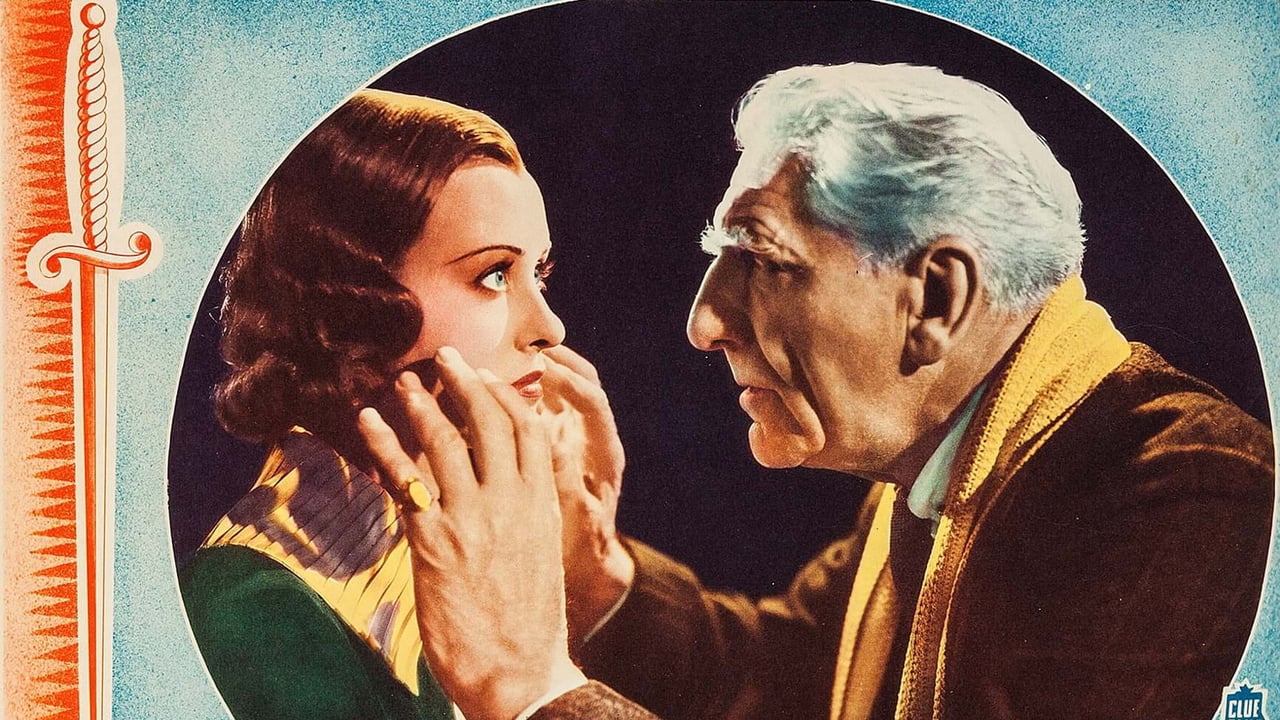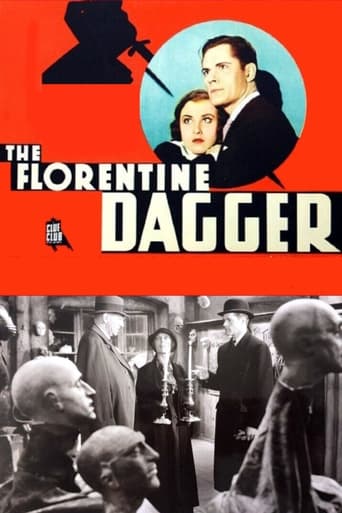



Great Film overall
It's the kind of movie you'll want to see a second time with someone who hasn't seen it yet, to remember what it was like to watch it for the first time.
View MoreGreat example of an old-fashioned, pure-at-heart escapist event movie that doesn't pretend to be anything that it's not and has boat loads of fun being its own ludicrous self.
View MoreThere is definitely an excellent idea hidden in the background of the film. Unfortunately, it's difficult to find it.
View MoreDonald Woods plays a descendant of the infamous Borgia family who believes he is predestined for evil. When the father of the girl he loves (Margaret Lindsay) is murdered, Woods worries he might be responsible. I'm a big fan of Margaret Lindsay. She's one of my favorite actresses from this period that doesn't get much recognition and she's the primary reason I watched this. She doesn't have a very juicy part but she makes the most of it. Donald Woods is boxing above his weight class here. The role requires a more theatrical actor I think. Woods is a little too stiff for such a neurotic character. Robert Barrat steals every scene he's in as the police inspector investigating the murder. A minor thing but I liked the use of model trains in a couple of early scenes. It may seem cheap today but I think it adds a quaint charm to the movie. A nice little programmer from WB with a neat ending. A little silly at times but interesting enough to warrant checking out.
View MoreFlorentine Dagger, The (1935) ** (out of 4) Yet another murder/mystery with this time a young play-write (Donald Woods) stopping off in a small village where he meets a beautiful young woman (Margaret Lindsay) who he wants in his latest play. Soon the play is a hit and they want to be married but her father (Henry O'Neill) refuses permission but soon he's found dead with a dagger in his heart. That's pretty much the set-up to this thing but in the end I found the majority of the picture to be downright boring with very little going for it. I've always thought Florey did his best work outside this genre as it just seemed like he never could pull things together very well. I think the biggest problem with this film isn't his direction but instead it's the screenplay that doesn't offer up any decent characters and the weak story is just a major drag. I had a very hard time getting into the film early on simply because the characters were all underwritten and even worse is the fact that the movie itself doesn't really know what it wants to do. Yes, we eventually get the mystery but everything is pretty dry without any small laughs and the romance is pretty boring as well. Woods is usually a very reliable actor but even he seems very bored here as he goes from one scene to another without too much energy and seems to be lacking any type of passion. Lindsay is also pretty bland in his role but so is O'Neill as the soon-to-be-dead father and Robert Barrat does very little with the Inspector role. C. Aubrey Smith is good as the doctor who ends up staying close to Woods. Florey does add a couple nice touches including a rich atmosphere in the house as well as a few other scenes where the darkness does some justice but in the end this thing is just too flat for its own good.
View MoreThe Florentine Dagger is a strange little film full of atmosphere, but lacking the acting punch that might have put it over. A story of the curse of the Borgias in modern-day Vienna opens with three travelers (Donald Woods, C. Aubrey Smith, and Henry O'Neill) making a trip to a remote village in Italy where the Borgia castle still stands. The old inn is full of atmosphere and run my strange people (Charles Judels, Rafaella Ottiano). They take a tour which allows the viewer to be given the story of the Borgias' madness and its generational effects. Woods is Casare Borgia, the spitting image of an ancient ancestor (although the name is pronounced Cesar throughout the film). Woods decides to end the madness and orders a drug from the local apothecary. However, Smith (a psychiatrist) intervenes and tells Woods that the potion is fake. O'Neill is a famous theatrical producer. So Smith advises that Woods write a play and purge his Borgia madness. Of course Woods writes a play about Lucretia Borgia, which O'Neill produces. He also casts his "daughter" in the lead (Margaret Lindsay). The play is the talk of Vienna.Woods and Lindsay fall in love, but O'Neill is stabbed to death with one of the three Florentine daggers we had seen displayed earlier. Woods becomes the main suspect because of his erratic behavior and he is, after all, a Borgia. But Lindsay seems a tad off also. And Smith is always lurking. Enter the local inspector (Robert Barrat), a happy fellow who seems totally uninvolved with the murder case and is always receiving phone calls from Julia. Lindsay had left the play in a rush and is jailed on suspicion of murder. But then there is another dagger attackthis time on Smith. That clears Lindsay. Or does it? The police had let her go. Woods and Smith end up at an auction house, following a wigmaker (Eily Malyon) who buys the candle sticks that were found by O'Neill's body. Everyone converges at the wigmaker's shop and the crime is solved. All very tidy and clever. Barrat threatens to steal the film from the more stolid actors, but his character is too unbelievable, especially as he lets the murderer go free! Go figure.Paul Porcasi is a police man, Henry Kolker is the auctioneer, Florence Fair is the weird maid, Herman Bing (who has no part) is the baker, Louise Seidel is his assistant, and Frank Reicher is the stage manager. Woods is boring, Lindsay is miscast, and Smith is relatively subdued. Only Barrat and Malyon seem to have much life. Judels serves as the castle your host, but Ottiano seems irrelevant to the story. Makes one wonder about the editing here as Ottiano and Bing have no reasons to be in the story. And the play is a STINKER!
View MoreAlthough technically made after more stringent censorship resumed, THE FLORENTINE DAGGER (1935) violates the expectations of both formula and the censorship of the time. The movie was the result of a hasty production that did not augur well for it. Director Robert Florey was designated to helm the project only a week before shooting began. Tom Reed's script was still being rewritten and substantially changed during photography, with the entire ending changed. Star Donald Woods was considered too inexperienced for the lead, and on the first day of shooting he became so nervous that he lost his voice. The movie was shot in a mere 20 days, on a $135,000 budget. Nonetheless, for Warner Bros., in 1935, this did not make THE FLORENTINE DAGGER, properly speaking, a "B," but instead it was intended as an unusual, high-quality item. 1. Writer Reed and director Florey had already collaborated in similar capacities on MURDERS IN THE RUE MORGUE (Universal, 1932). THE FLORENTINE DAGGER added themes not present in the Ben Hecht novel but which deepened it considerably. Using a "pre-noir" style, the consistently strange, unnatural behavior of each of the performers is augmented by Florey's expressionistic treatment, with painterly camera-work by Arthur Todd, full of oblique angles, dark lighting, shadow effects, and composition in depth, heightening moments of drama and character revelation. Many objets d'art from director Florey's own collection enrich the set design and enhance the chilling mood it creates. In a move seldom allowed contract directors, Warner Bros. permitted Florey to oversee the editing, so that pace, choice of shots, and narrative all combine together to memorably explore the psyche of its characters.Operating on multiple levels, THE FLORENTINE DAGGER delves past a surface mystery into a domain where the apparently dead past intrudes on the present, releasing ungovernable passions. Woods plays a modern descendant of the Borgias, Cesare, driven to the brink of suicide by his belief that he has a dual personality, with his subconscious half inheriting the murderous proclivities of his ancestors. A misogynist psychiatrist, Dr. Lytton (C. Aubrey Smith) suggests Cesare exorcise his internal demons by writing a play on the Borgias, but no sooner has he done so, and been supposedly cured of his obsession, than events shed doubt on the viability of such a cure. Cesare falls in love with leading lady Florence Ballau (Margaret Lindsay), but it appears she is becoming her role--Lucretia Borgia. Florence is accused of murdering her father, theatrical producer Victor Ballau, but in investigating on her behalf, Cesare uncovers a maelstrom of revenge and bitterness stretching back over two decades. While Cesare's fear is the product of his own delusion, others are experiencing deep and far more real psychological turmoil. Victor, at first the apparent victim of a crime, turns out to be far more depraved than even Cesare could imagine. Victor was, in fact, Florence's stepfather, who tried to kill her mother, stage star Teresa (Florence Fair), by setting her dress afire. She survived, hiding her now hideously scarred visage behind a naturalistic mask and impersonating a servant to be with Florence. Not until Victor begins to nearly-incestuously force himself on stepdaughter Florence, having fallen perversely in love with her and jealously attempting to destroy her romance with Cesare, does Teresa finally take vengeance against the patriarchal power that has nearly destroyed the lives of two women. Overhearing Teresa's confession to Cesare, psychiatrist Lytton realizes his theories of patricide have been entirely wrong, and the police inspector in charge of the case allows Teresa, Florence, and Cesare, to escape together--without the compensatory suicide of Teresa called for by the original script and Hays Office policy. Only by assuming that the Hays Office was paying little attention to a modestly-budgeted thriller, whose conclusion was changed in production, can we explain how a film so obviously in violation of the tenets of the code was allowed. Somehow, this film was released, without much recognition by critics of just how unusual it was. Today, The Florentine Dagger can be recognized as one of the truly subversive films of its era, and one whose content would not be accepted in films until at least forty years later, making it decades ahead of its time.
View More